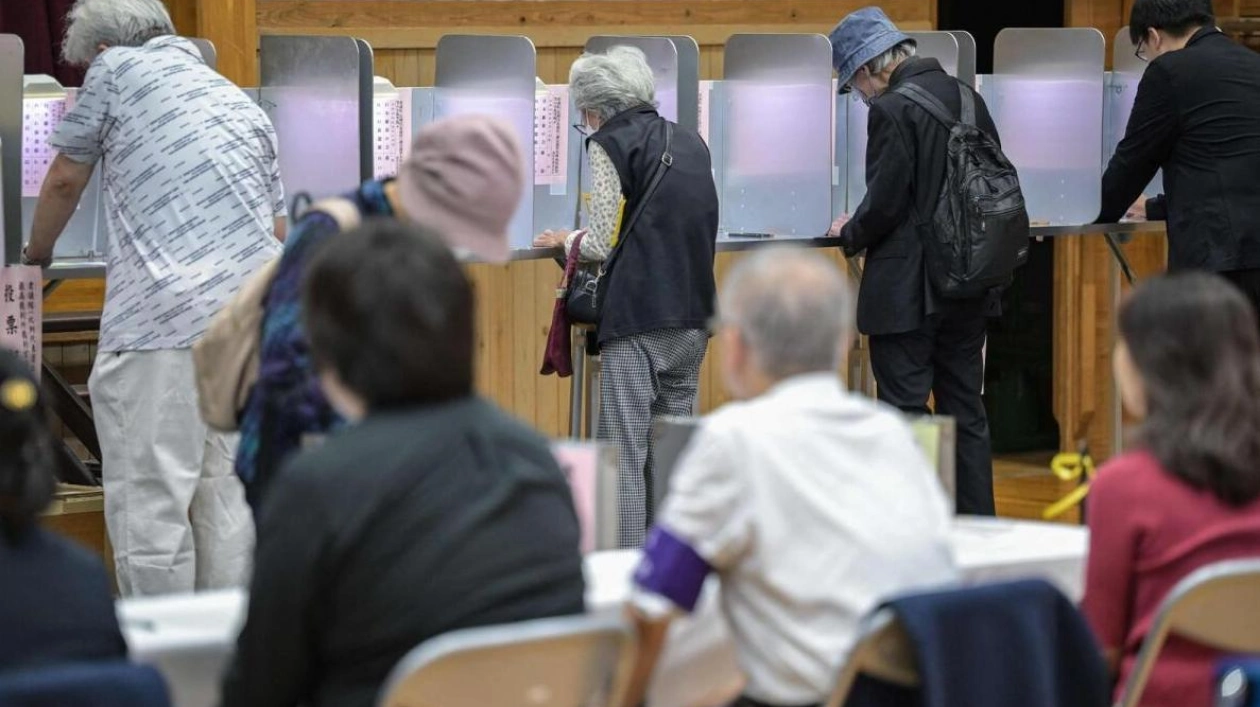Officials observe as citizens cast their votes during the general election at a polling station established in a local school in Tokyo on Sunday. – AFP
Japan participated in its most competitive election in years on Sunday, with new Prime Minister Shigeru Ishiba and his formidable Liberal Democratic Party potentially facing their worst outcome since 2009. Opinion polls indicate that the conservative LDP and its junior coalition partner may fall short of securing a majority, a result that could significantly impact Ishiba's standing. The 67-year-old former defense minister assumed office and called for a snap election after narrowly winning the leadership of the LDP last month, a party that has dominated Japanese politics for nearly seven decades. However, voters in the world's fourth-largest economy have been unsettled by rising prices and the repercussions of a party slush fund scandal that contributed to the downfall of previous premier Fumio Kishida.
"I prioritized their economic policies and measures to combat inflation when making my decision," Tokyo voter Yoshihiro Uchida, 48, told AFP on Sunday. "I voted for candidates who are likely to improve our lives." Ishiba has vowed to rejuvenate rural areas and address the "silent crisis" of Japan's declining population through family-oriented measures such as flexible working hours. However, he has softened his stance on allowing married couples to retain separate surnames and appointed only two women to his cabinet. The self-proclaimed security policy expert has advocated for the formation of a regional military alliance akin to NATO to counter China, though he has acknowledged that such an alliance would not materialize quickly.
Several polls conducted by Japanese media suggest that the LDP and its coalition partner Komeito might fall short of the 233 lower house seats required for a majority. Ishiba has set this threshold as his goal, and failing to achieve it could weaken his position within the LDP and necessitate the formation of new coalition partners or leading a minority government. "We aim to rebuild as a fair, just, and sincere party and seek your support," Ishiba stated at a rally on Saturday. Local media has speculated that Ishiba could resign immediately to take responsibility, potentially becoming Japan's shortest-serving prime minister post-World War II. The current record is held by Naruhiko Higashikuni, who served for 54 days, four days longer than British leader Liz Truss in 2022, shortly after Japan's defeat in 1945.
In numerous districts, LDP candidates are closely matched with those from the Constitutional Democratic Party (CDP), the second-largest party in parliament, led by former prime minister Yoshihiko Noda. "The LDP's policies are primarily focused on swiftly implementing measures for those who provide them with substantial funds," 67-year-old Noda told his supporters on Saturday. "However, those in vulnerable situations... have been neglected," he added, criticizing the government for inadequate support for survivors of an earthquake in central Japan. Noda's stance "is somewhat similar to the LDP's. He is fundamentally a conservative," Masato Kamikubo, a political scientist at Ritsumeikan University, told AFP. "The CDP or Noda can serve as an alternative to the LDP. Many voters believe this," Kamikubo said.
Ishiba has pledged not to actively support candidates involved in the funding scandal. "I prefer to focus on young candidates rather than those with long careers, as they may offer something different," said a 63-year-old voter who identified herself as Taniyama, noting that she "made her decision by process of elimination." Mitsuyuki Ikezoe, 86, voted for the LDP, expressing concern that "North Korea or Russia might invade Hokkaido" in northern Japan. However, he speculated that "Ishiba may be disregarded by the United States due to his newness," and if Donald Trump returns as president, "he will not give Ishiba the time of day," Ikezoe said.
Source link: https://www.khaleejtimes.com






